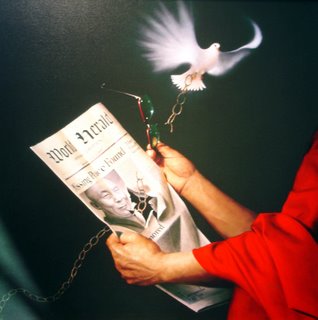
Just because an idea or way of doing things is popular doesn't mean it's right for everyone. However, part of the way that something becomes popular is that many of us don't take the time to determine what's right for us; we simply do what most of the people we know are doing. In this way, our decisions about life are made by default, which means they aren't what we call conscious decisions. There may be many other options available, but we don't always take the time to explore them. This may be the result of feeling overwhelmed or pressured by family, peers, and humanity at large, to do things their way, the way things have always been done. Regardless of the cause, it is important that, as often as we can, we decide for ourselves what to do with our lives rather than just drift along on the current of popular opinion.
It is not always easy to make decisions that go against the grain. Many people feel threatened when those close to them make choices divergent from the ones they are making. Parents and grandparents may be confused and defensive when we choose to raise our children differently from the way they raised us. Friends may feel abandoned if we decide to change our habits or behavior. Meanwhile, on our side of the fence, it's easy to feel frustrated and defensive when we feel unsupported and misunderstood simply because we are thinking for ourselves. It can be exhausting to have to explain and re-explain our points of view and our reasons.
This is where gentleness, openness, and tolerance come into play. It helps if we are calmly persistent, consistent, and clear as we communicate to those around us why we are making the choices we are making. At the same time, we have the right to say that we are tired of talking about it and simply need our choices to be respected. Our lives belong to us and so do our decisions. Those who truly love us will stand by us and support our choices, never mind what's popular.
[I receive a "thought for the day" on my E-mail, and thought this article was quite timely.]
After 9 long years, and the last 3 years of wanting to attend the local Interfaith Symposium, I plan to attend this years 9th Annual Interfaith Symposium. A bringing together a variety of faiths so we can better understand the various members of our community and ultimately my hope is that the old adage of "United we stand divided we fall" will come into play where we understand one another and are lest apt to judge and more importantly work together for a more cohesive county and global outlook in the long run.
The following is the write up from our local newspaper pertaining to last years gathering:
8th annual Interfaith Symposium in Bakersfield Posted on Wednesday, 09/28/05 - 10:09 PM
By MARK BARNA, Californian staff writer e-mail: mbarna@bakersfield.com
Posted: Friday, September 23rd, 2005, 9:55 PM
Last Updated: Friday, September 23rd, 2005, 9:55 PM
As Bakersfield's population continues to grow, so will the need for interfaith dialogue. Joining the legion of Christians in the city will be more Jews, more Hindus, more Sikhs, more Buddhists and more Muslims.
Understanding one another's religion goes a long way toward engendering an openness among people of different faiths, say organizers of the Eighth Annual Interfaith Symposium, taking place next Saturday at the Beale Library downtown.
Speaking at the event will be representatives of four of the five major religions. Attendance is free.
The theme of this years event, which is sponsored largely by members of the Hindu Temple of Kern County, is a look at the contributions Indian leader Mahatma Gandhi made to spirituality and interfaith dialogue.
Representing Hinduism at the symposium are scholars Bharat and Nilima Bhatt of Massachusetts.
“I will talk about how a person's relationship with God influences how they relate to society and to people of other faiths,” Nilima Shukla-Bharat said.
Speakers will also discuss the similarity of religious precepts found in each of the world's faiths. “Each religion teaches us to love one another,” Bharat said. “And each tradition brings a different perspective that contributes to the idea of love.”
Barry Goldner, president of the Temple Beth El congregation in Bakersfield, will talk about Judaism.
“My experience with the various religions,” Goldner said, “is that the core values generally appear to be pretty similar. And I appreciate the fact that this program gives everyone an opportunity to offer their perspectives.”
Bharat Bhatt will be speaking on Ghandi, who fervently studied the world's major religions. The Indian leader developed an ecumenical sensibility toward religions early in life through his Hindu upbringing, a tradition open to other faiths, Bhatt said.
Ghandi also taught of the dangers of a consumer society and the need for nonviolence and for harmony with nature.
“Ghandi represents the genuine feeling of all people of all faiths,” Bhatt said.
Also scheduled to speak are Ranjeet Singh on the Sikh faith, David Bulbchum on Buddhism, the Rev. Kimberly Willis on Christianity and Daaiyah Islam on Islam.



2 comments:
You been busy on your site. Just got internet back. It was fun catching up
I LIKE the new site--looking good! Also, there is a Chabad in Bakersfield now as well--someplace we can go for Shabbat if we come to stay with you guys!
We're off to Safed tomorrow for a couple of days with Josh--we'll hopefully come back with pictures and nice memories to share with you.
Post a Comment